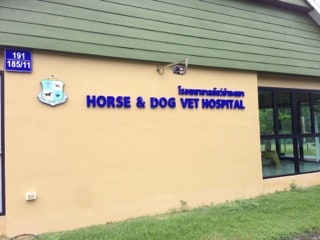Diagnosing and Treating Canine Dry Eye in a Third World Country
For this week’s Daily Vet column, I’ve decided to write about my experience as a visiting foreign doctor in a Third World country.
This trip to Thailand was a nice combination of work and relaxation, which I prefer to call "workation." The work was centered around establishing a professional relationship with Soi Dog Foundation for an upcoming television project I have in development. The relaxation came in the form of a few days’ stay at the lovely Villa Beyond Bang Tao, which was built and is managed by my partner’s brother.
At the Villa Beyond lives a cute Shih Tzu named Euro, whom I met in 2009 on my first trip to Thailand. Since then, Euro has been the unfortunate recipient of severe trauma from a dogfight that fractured his mandible (jawbone) and proptosed (pushed out of the socket) and ruptured his left eye. After undergoing four surgeries to repair his jaw, which required multiple trips to a veterinary surgeon in Bangkok, Euro is in a much better state.
Considering I was a well-taken-care-of guest of Euro’s human caretaker, I offered to examine and help Euro within my capacity as a foreign veterinarian. Upon preliminarily examining Euro, I discovered a dog quite different from the one I met four years ago.
The trauma to Euro’s jaw is causing right sided facial pain, as evidenced by his vocalization on palpation, and at attempted opening of his mouth. He also shows more significant accumulation of dental tartar, calculus, and gingivitis (i.e., periodontal disease) on his right side as compared to the left. These are signs that Euro is relying more on his left side than his right to chew.
Unfortunately, Euro’s incident has caused blindness on his left side. The left eye is phthisical (small or wasted away) and chronically dry and coated with a mucopurulent (mucus and "pus") discharge.
Euro’s right eye is also showing some more subtle abnormalities. Corneal changes called pigmentary keratitis (brown to black pigment deposition on the surface of the eye causing a "marble" like appearance) were apparent, which commonly occurs in dogs afflicted by Keratoconjunctivitis Sicca ("dry eye"). Breeds like the Shih Tzu are especially prone to KCS. Adult to geriatric dogs are more commonly diagnosed with KCS than younger pooches.
Diagnosing KCS is fairly routine from a technical perspective. But, could I access the needed supplies to do so and then start Euro on the appropriate medications to manage his condition? To find out, we embarked on a short drive over to a local veterinary hospital with a very unique name, Horse & Dog Vet Hospital, where Euro had previously been treated.
We waltzed right in, placed Euro on the counter, and I then launched into my spiel: "Hello, I’m Dr. Patrick Mahaney, a holistic veterinarian from California and trying to help my friend’s dog, who I suspect has dry eye," and presented one of my business cards.
To my surprise, the on-site veterinarian, Dr. Jutiwat Danworanun, readily dispensed a package of Schirmer Tear Test (STT) strips and permitted me to begin my own diagnostic testing on Euro. Sixty seconds later, I had officially diagnosed Euro with KCS in both eyes, with the right being worse than the left.
We purchased a tube of Cyclosporine (an immune system modifying agent that promotes tear production in KCS patients) and a bottle of Tobramycin (an antibiotic to treat common bacterial infections associated with KCS). Later in the day, I sought guidance on Euro’s ongoing care with my favorite veterinary ophthalmologist, Dr. Christin Fahrer (Eye Care for Animals). Euro’s dad will be medicating continually with Cyclosporine and repeating a STT at eight and twelve week intervals.
I appreciate the fact that Dr. Danworanun let me a call the shots in making a diagnosis and prescribing treatment. Although I’d like to extend the same courtesy, I couldn’t legally offer the same option to a veterinarian not licensed within the state in which I practice unless he/she was working in some capacity under my supervision (e.g., contractor, intern, etc.).
In the U.S, our society is so litigious. In school and in practice, we are trained to consider the potential legal implications associated with the medical scenarios in which we are involved and to never break the rules.
Fortunately for Euro, improvement is already being seen in both of his eyes. With consistent treatment and follow up, his KCS should stay under control.
ยูโร
Euro
ม้าภูเก็ตและโรงพยาบาลสัตวแพทย์สุนัข
Talang Phuket Horse and Dog Vet Hospital

Dr. Patrick Mahaney
Image: Vasiliy Ptitsyn / via Shutterstock


